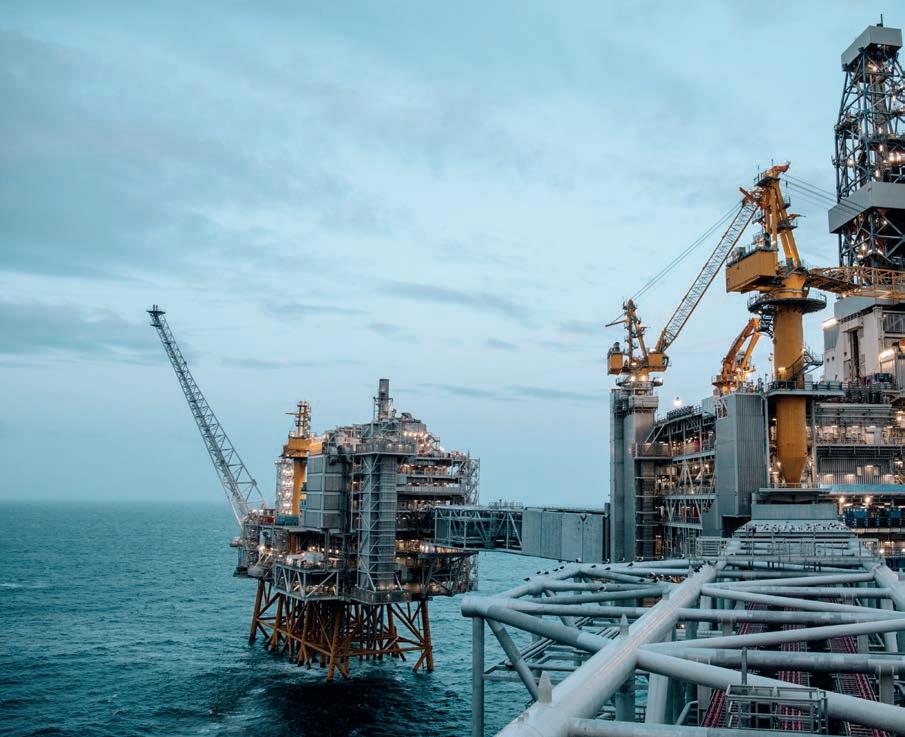
2 minute read
Putng energy to work
Putting energy to work
The petroleum sector will remain a signifcant factor in the Norwegian economy in the years to come, although not on the same scale as today.
Advertisement
Photo courtesy of Equinor/ Ole Jørgen Bratland.
THE NORWEGIAN GOVERNMENT PUBLISHED ITS REPORT TO THE STORTING (WHITE PAPER) ‘PUTTING ENERGY TO WORK’ RECENTLY, EXPLORING THE LONG-TERM VALUE CREATION FROM NORWEGIAN ENERGY RESOURCES. THE WHITE PAPER SETS OUT HOW NORWAY CAN USE ITS ENERGY RESOURCES TO CREATE CONTINUED ECONOMIC GROWTH AND NEW JOBS.
Norway’s positon as an energy naton will be further developed through new initatves encompassing hydrogen, ofshore wind, strengthening of the power grid, and a low emissions oil & gas sector. The white paper further expands on the government’s comprehensive climate acton plan and demonstrates how renewable energy and the power grid are laying the foundatons for electrifcaton and the phasing out of fossil-fuel based energy.
Green transition
“I am proud to present the government’s plan for job and value creaton based on our energy resources. The green transiton is happening right now. We see concrete plans for new enterprises based on renewables such as batery plants and hydrogen producton. We will facilitate more proftable producton of renewable energy, and bolster our power grid”, says Minister of Petroleum and Energy Tina Bru. “Ofshore wind represents an industrial opportunity for Norway and may form an important part of the next chapter in our history as an energy naton. We are now taking signifcant steps to facilitate ofshore wind power, both foatng installatons as well as botom-fxed ones”, Ms Bru adds.

Norwegian Minister of Petroleum and Energy Tina Bru.
and Energy. Image courtesy of Equinor.

More jobs and prosperity
The government wants Norwegian energy resources to form the basis for more jobs and prosperity in society. Thus, the white paper has been ttled Putng Energy to Work. The oil & gas industry currently faces major challenges as a result of maturing felds on the Norwegian contnental shelf and increasing demands for lower emissions. The petroleum sector will remain a signifcant factor in the Norwegian economy in the years to come, although not on the same scale as today. The government will facilitate long-term economic growth in the petroleum industry within the framework of its climate policy and commitments under the Paris Agreement.
Future-oriented
The white paper outlines four goals for longterm economic growth due to Norwegian energy resources: • Economic growth that creates jobs in
Norway. • Using electrifcaton for making Norway a greener country. • Establishment of new, proftable industries. • The further development of a futureoriented oil & gas sector within the framework of the climate change goals. “We must prepare for the fact that the petroleum industry will not remain the same driving force in our economy as previously. We will facilitate a futureoriented Norwegian oil & gas industry capable of delivering producton with low emissions within the framework of our climate policy. Retaining expertse and technologies in the oil & gas sector is also vital for the development of new industries and technologies such as carbon capture and storage, ofshore wind, and hydrogen. The main goal of the government’s petroleum policy – to facilitate proftable producton in the oil and gas industry in a long-term perspectve – is frmly in place”, concludes Ms Bru.










